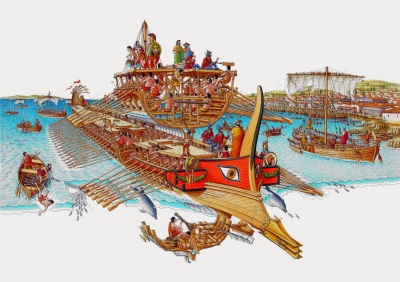Flamboyant Athenian admiral during the 431–404 b.c. Peloponnesian War. His ambition, aristocratic lineage, great wealth, and remarkable good looks marked Alcibiades for leadership. Early in the war he participated as an infantryman in the siege of Potidaea and fought on horseback at the battle of Delium. According to Athenian tradition, in the former battle his friend, the philosopher Socrates, saved his life, and in the latter conflict Alcibiades returned the favor by protecting Socrates during the Athenian retreat.
During the Peace of Nicias, which ended the first phase of the Peloponnesian War in 421 b.c., Alcibiades advocated an aggressive policy toward Sparta. Elected general in 416 b.c., he took part in the infamous attack on the small island state of Melos and the resulting atrocities. In the following year he successfully argued for a daring military expedition to Sicily and sailed as one of its commanders.
Unfortunately, his implication in the scandalous sacrilegious activities that had marred the departure of the expedition led to his recall before the fleet reached Sicily.
Fearing prosecution in Athens, Alcibiades himself guaranteed the expedition’s failure when he defected to the Spartans and advised them on how to blunt the Athenian assault on Sicily and penetrate Athenian home defenses. By these actions he severely weakened Athens.
Serving with the Spartan fleet in 413–411 b.c., Alcibiades encouraged an oligarchic revolution at Athens but then cast his lot with the democratic government in exile, which elected him admiral. His brilliant naval victory against the Spartans at Cyzicus allowed him to return to Athens in 408 b.c. and accept an extraordinary naval command. But in 406 b.c. the defeat of his fleet at Notion in his absence led to his final exile from Athens.
Despite this rejection, in 405 b.c. Alcibiades visited the Athenian fleet on the Hellespont to warn them of their precarious position, but his advice was not trusted. This set the scene for the destruction of the Athenian fleet at Aegospotami in the final battle of the Peloponnesian War. Shortly thereafter, Alcibiades died in an ambush in Phrygia, killed either by the Spartans or by a family in revenge for his seduction of one of their women.
